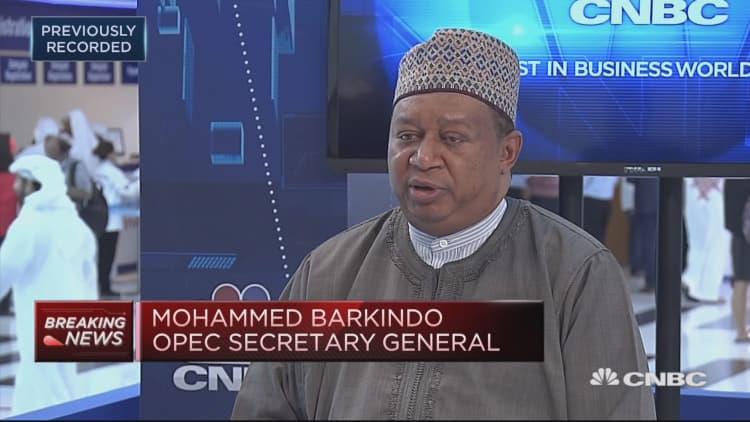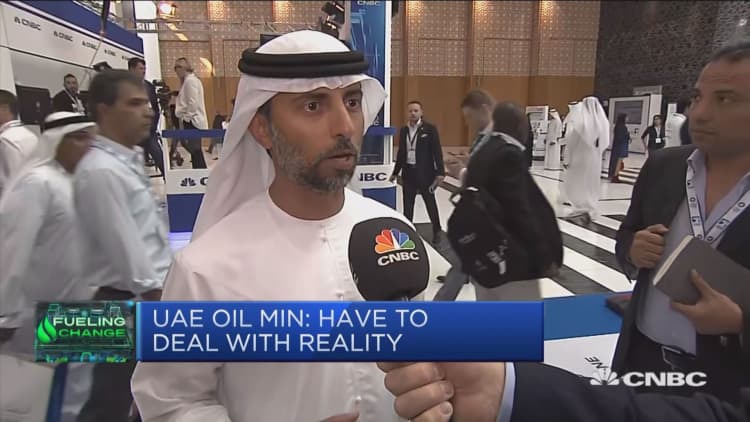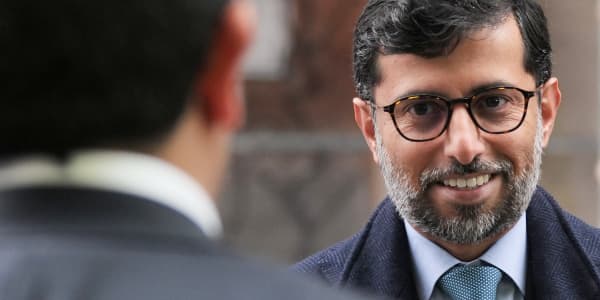
OPEC officials quickly sought to reassure energy market participants on Wednesday, as oil prices fluctuated wildly ahead of a much-anticipated meeting between the influential oil cartel and its allied partners in early December.
The growing prospect of OPEC and non-OPEC members cutting output next month helped Brent crude rebound toward $66 a barrel Wednesday morning.
It comes after OPEC President (and United Arab Emirates Energy Minister) Suhail al-Mazrouei and OPEC Secretary General Mohammed Barkindo said there was a consensus among the group to support a decision to balance the market in Vienna, Austria on December 6.
Speaking to CNBC at the ADIPEC oil summit in Abu Dhabi Wednesday, Barkindo said the Middle East-dominated group remains jointly focused with efforts to "restore stability" in energy markets.
Shortly thereafter, Mazrouei told CNBC's Steve Sedgwick that OPEC would be careful not to "overreact" to this latest bout of oil market volatility. Instead, the 15-member group and its allied partners would "do what is necessary" over the coming weeks.
Russian reluctance
Since mid-October, the price of international benchmark Brent crude has fallen almost 18 percent amid escalating concerns about excess supply and growing demand. It has been one of the biggest declines in crude futures since a price collapse in 2014.
That has prompted OPEC to make increasingly frequent public statements to the market, promising to do "whatever it takes" to tighten supply and reverse sharp price declines.
After a Joint Ministerial Meeting Monitoring Committee (JMMC) meeting in Abu Dhabi on Sunday, the group again repeated this sentiment by saying they would not shy away from further production cuts.
OPEC kingpin Saudi Arabia has signaled it could once again curtail output by as much as 500,000 barrels per day in December.

But, Russia — a key member of the OPEC and non-OPEC alliance — has urged the wider group not to overreact to short-term price movements.
Speaking to reporters in Singapore on Wednesday, Energy Minister Alexander Novak said: "We remember that the oil price was sharply rising in the same way, now it is going down. We have to look into long-term development into how the price will be stabilized."
"It's not right for market participants to react to any one-off fluctuations," Russia's Novak said, before adding the energy market was not able to fully comprehend the fallout from U.S. sanctions against Iran.
Moscow has been cutting oil production by 20,000 barrels per day from October levels so far this month, Novak said.
Changing course
About two dozen exporting nations began capping their output in 2017 in a bid to drain a global crude glut.
The group relaxed this strategy in June, but in September, some of the world's leading oil producers were talking about pumping extra oil onto the market in order to help soothe intensifying supply shock fears.
So, with top exporters once again talking about cutting production in December, Russia's Novak has warned against the group making any "hasty" policy changes.
Speaking to CNBC on Sunday shortly after the JMMC meeting, Novak added: "We need to look at the situation very carefully to see how it will develop so that we don't end up changing our course by 180 degrees every month."
Price risks
Meanwhile, any decision to cut output levels could also put OPEC and non-OPEC producers on a collision course with the United States.
President Donald Trump is publicly in favor of low fuel prices and has urged the group not to reduce crude production next month.
"Price risks remain firmly skewed to the downside with market sentiment caught in a pincer movement of rising supply and softening demand," Stephen Brennock, oil analyst at PVM Oil Associates, said in a research note published Wednesday.
"Moreover, any reprieve from the current malaise lies with the outcome of next month's OPEC and non-OPEC meeting. Until then, any hope for a bout of sell-off fatigue will be wishful thinking."





